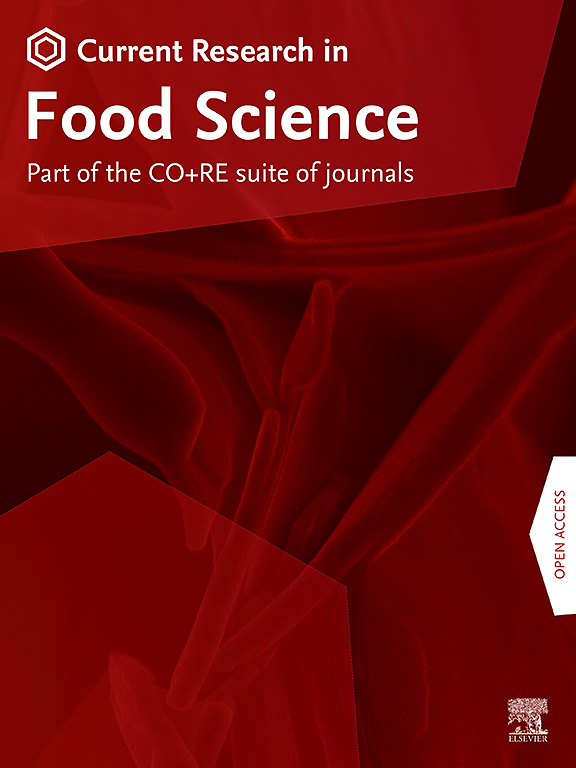Ginsenosides 20R-Rg3 and Rg5 enriched black ginseng inhibits colorectal cancer tumor growth by activating the Akt/Bax/caspase-3 pathway and modulating gut microbiota in mice
IF 6.2
2区 农林科学
Q1 FOOD SCIENCE & TECHNOLOGY
引用次数: 0
Abstract
Black ginseng (BG) is of great interest for its anti-cancer property. Its detailed mechanism, however, is still lacking. This study aims to evaluate the effectiveness of ginsenosides 20R-Rg3 and Rg5 enriched BG (Rg3/Rg5-BG), innovatively prepared by low temperature steam-heating process, against colorectal cancer (CRC), and elucidate its potential molecular mechanism. Interestingly, much higher concentrations of rare ginsenosides were detected in this unique BG than those in red ginseng, especially 20R-Rg3 and Rg5, which may contribute to treatment of CRC. As expected, Rg3/Rg5-BG demonstrated a dose-dependent reduction in cancer cell viability, along with the induction of cell apoptosis and cell cycle arrest. Moreover, Rg3/Rg5-BG retarded tumor growth in the model mice, as evidenced by downregulation of anti-apoptotic Bcl-2 protein and phosphatidyl Akt, and upregulation of the apoptotic proteins Bax, caspase-8, and cleaved caspase-3, enhancing apoptosis of tumor cells. Additionally, Rg3/Rg5-BG treatment improved the gut microbiota and intervened with bacteria associated with cancer development, including increasing beneficial probiotics such as Candidatus_Saccharibacteria and Saccharibacteria_genera_incertae_sedis and decreasing pernicious bacteria (Vampirovibrio, Clostridium_XlVb, etc.). Our results manifested for the first time that Rg3/Rg5-BG exerted its anti-cancer effects: through activation of the caspase-3/Bax/Bcl-2 pathway and by altering the gut microbiome composition, thus paving the way for new therapeutic strategies that incorporate natural products in cancer treatment.

富含人参皂苷20R-Rg3和Rg5的黑参通过激活Akt/Bax/caspase-3通路和调节小鼠肠道微生物群抑制结直肠癌肿瘤生长
黑参(BG)因其抗癌特性而备受关注。然而,它的详细机制仍然缺乏。本研究旨在评价低温蒸汽加热法创新制备的人参皂苷20R-Rg3和Rg5富集BG (Rg3/Rg5-BG)对结直肠癌(CRC)的治疗作用,并阐明其可能的分子机制。有趣的是,在这种独特的BG中检测到的稀有人参皂苷浓度远高于红参,特别是20R-Rg3和Rg5,这可能有助于治疗结直肠癌。正如预期的那样,Rg3/Rg5-BG显示出剂量依赖性的癌细胞活力降低,同时诱导细胞凋亡和细胞周期阻滞。Rg3/Rg5-BG抑制模型小鼠肿瘤生长,下调抗凋亡Bcl-2蛋白和磷脂酰Akt,上调凋亡蛋白Bax、caspase-8和cleaved caspase-3,促进肿瘤细胞凋亡。此外,Rg3/Rg5-BG治疗改善了肠道微生物群,干预了与癌症发展相关的细菌,包括增加有益的益生菌,如Candidatus_Saccharibacteria和saccharibactera_genera_incertae_sedis,减少有害细菌(Vampirovibrio, Clostridium_XlVb等)。我们的研究结果首次表明Rg3/Rg5-BG通过激活caspase-3/Bax/Bcl-2通路和改变肠道微生物组组成发挥其抗癌作用,从而为将天然产物纳入癌症治疗的新治疗策略铺平了道路。
本文章由计算机程序翻译,如有差异,请以英文原文为准。
求助全文
约1分钟内获得全文
求助全文
来源期刊

Current Research in Food Science
Agricultural and Biological Sciences-Food Science
CiteScore
7.40
自引率
3.20%
发文量
232
审稿时长
84 days
期刊介绍:
Current Research in Food Science is an international peer-reviewed journal dedicated to advancing the breadth of knowledge in the field of food science. It serves as a platform for publishing original research articles and short communications that encompass a wide array of topics, including food chemistry, physics, microbiology, nutrition, nutraceuticals, process and package engineering, materials science, food sustainability, and food security. By covering these diverse areas, the journal aims to provide a comprehensive source of the latest scientific findings and technological advancements that are shaping the future of the food industry. The journal's scope is designed to address the multidisciplinary nature of food science, reflecting its commitment to promoting innovation and ensuring the safety and quality of the food supply.
 求助内容:
求助内容: 应助结果提醒方式:
应助结果提醒方式:


